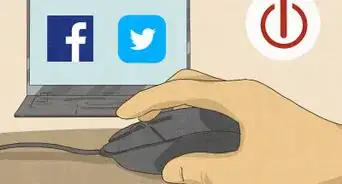This article was co-authored by Andrew Lokenauth. Andrew Lokenauth is a Finance Executive who has over 15 years of experience working on Wall St. and in Tech & Start-ups. Andrew helps management teams translate their financials into actionable business decisions. He has held positions at Goldman Sachs, Citi, and JPMorgan Asset Management. He is the founder of Fluent in Finance, a firm that provides resources to help others learn to build wealth, understand the importance of investing, create a healthy budget, strategize debt pay-off, develop a retirement roadmap, and create a personalized investing plan. His insights have been quoted in Forbes, TIME, Business Insider, Nasdaq, Yahoo Finance, BankRate, and U.S. News. Andrew has a Bachelor of Business Administration Degree (BBA), Accounting and Finance from Pace University.
This article has been viewed 250,111 times.
Let's face it, we all love money and love to spend that money. But, think for a second. Would you rather have a little money now, or more money later?
Steps
-
1Get some money. Check out other articles such as Make Money (for Teenagers).
-
2Save as much of the money you make as you can.[1]Advertisement
-
3Ask your parents to open up a savings account for you. Once you have some money saved, setting up a savings account can be very helpful. It will eliminate the temptation of wanting to spend that money.[2]
-
4Try to find some odd jobs. If you are not old enough to get a job, work various jobs around the house, picking things up when you are not asked, or working extra hard on something that could earn some money.[3]
- If you are old enough, consider seeking out babysitting jobs.
- Ask your parents for a deal with your parents involving your grades. For example, for every 'A' grade you receive, you get £5 or $5.
-
5Start saving young. Let's say you get £10 ($10), save £5 ($5), and have the other £5 ($5) for yourself. After a while, this can really add up. If you save £5 a week, that is £260 a year. If you keep that up until you get a job you can have quite a bit of money saved. For example, let's say you start when you are 12 years old. £240 ($260) per year * 5 = £1,300 ($1,300). You could have £1,300 ($1,300) saved up for when you reach 17 and are in need of a car, and have the freedom and pride of driving yourself around.[4]
-
6Keep an organized analysis pad. You can purchase one at any office supply store. Put this with a calculator, a paper clip, and three pens: one red, one blue, and one black. Monitor every cent that moves in and out of your bank account and your pocket, and keep every receipt with the paper clip. This allows you to maintain an extremely accurate appraisal of your spending, updated with every purchase available on demand.[5]
-
7Make a tin can piggy bank. You can purchase a tin can piggy bank, or use a tin that you cannot open. You could get an empty hot chocolate powder tin and glue the top on.
- Next, cut a slit in the top wide a long enough to fit coins. When your money is in that tin, there is no way you can be tempted to spend it. Don't put all your money in the tin because you won't be able to get it back for a while!
- Once you've filled the tin, open it with a can opener! This is a great option for people who are bad at saving, can't get a bank account, or often find spare change that they left in a drawer months ago!
Expert Q&A
-
QuestionHow can you do fun things and still save money?
 Andrew LokenauthAndrew Lokenauth is a Finance Executive who has over 15 years of experience working on Wall St. and in Tech & Start-ups. Andrew helps management teams translate their financials into actionable business decisions. He has held positions at Goldman Sachs, Citi, and JPMorgan Asset Management. He is the founder of Fluent in Finance, a firm that provides resources to help others learn to build wealth, understand the importance of investing, create a healthy budget, strategize debt pay-off, develop a retirement roadmap, and create a personalized investing plan. His insights have been quoted in Forbes, TIME, Business Insider, Nasdaq, Yahoo Finance, BankRate, and U.S. News. Andrew has a Bachelor of Business Administration Degree (BBA), Accounting and Finance from Pace University.
Andrew LokenauthAndrew Lokenauth is a Finance Executive who has over 15 years of experience working on Wall St. and in Tech & Start-ups. Andrew helps management teams translate their financials into actionable business decisions. He has held positions at Goldman Sachs, Citi, and JPMorgan Asset Management. He is the founder of Fluent in Finance, a firm that provides resources to help others learn to build wealth, understand the importance of investing, create a healthy budget, strategize debt pay-off, develop a retirement roadmap, and create a personalized investing plan. His insights have been quoted in Forbes, TIME, Business Insider, Nasdaq, Yahoo Finance, BankRate, and U.S. News. Andrew has a Bachelor of Business Administration Degree (BBA), Accounting and Finance from Pace University.
Finance Executive There are a lot of free things you can do such as going to the library to borrow books, going to a park, and playing sports. There is a whole range of methods you can use to save money on movie theater tickets or theme parks. You can find many of these methods online.
There are a lot of free things you can do such as going to the library to borrow books, going to a park, and playing sports. There is a whole range of methods you can use to save money on movie theater tickets or theme parks. You can find many of these methods online.
Things You'll Need
- An empty tin
- Super glue
- A sharp knife
References
- ↑ https://www.listenmoneymatters.com/money-tips-for-teenagers/
- ↑ https://raisingchildren.net.au/pre-teens/family-life/chores-pocket-money/money-management-for-teens
- ↑ https://www.moneyadviceservice.org.uk/en/articles/how-to-help-teenagers-manage-their-money
- ↑ https://www.moneyadviceservice.org.uk/en/articles/how-to-help-teenagers-manage-their-money
- ↑ https://www.listenmoneymatters.com/money-tips-for-teenagers/
-Step-1-Version-4.webp)
-Step-2-Version-4.webp)
-Step-3-Version-4.webp)
-Step-4-Version-4.webp)
-Step-5-Version-4.webp)
-Step-6-Version-4.webp)
-Step-7-Version-3.webp)



-Step-18-Version-7.webp)




-Step-17-Version-2.webp)
-Step-16.webp)
-Step-12.webp)
-Step-16-Version-2.webp)
-Step-12-Version-3.webp)











-Step-18-Version-7.webp)


































